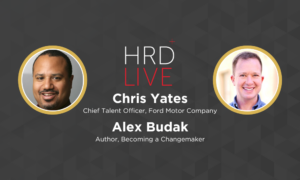Adapting to digital transformation and disruption
- 5 Min Read
Toby Peyton-Jones, HR Director at Siemens joined HRD Connect to discuss how businesses should adapt and respond to digital transformation, and the evolving role of leadership in this context. How have businesses adapted to technology over the last five years? Digitalisation is hugely affecting our business. It will disrupt all our business models, and therefore […]
- Author: Emma Smith
- Date published: Apr 4, 2017
- Categories

Toby Peyton-Jones, HR Director at Siemens joined HRD Connect to discuss how businesses should adapt and respond to digital transformation, and the evolving role of leadership in this context.
How have businesses adapted to technology over the last five years?
Digitalisation is hugely affecting our business. It will disrupt all our business models, and therefore we are working extremely hard on looking at both the opportunities and the threats within that. Of course, it is very volatile and unpredictable how the digital agenda will play out, so one of the things we are having to do is completely change our culture, leadership, management and way of working.
How has the role of the employee changed with digital transformation?
The estimates vary but potentially 60% of jobs will become automated. The reality is that a lot of professional roles will more or less be done by artificial intelligence.
So, what effect is it going to have on our employed population? We will absolutely need augmented intelligence – machines and people working together, but meta skills will become far more important – hybrid skills across domains. For example, if you know project management in the energy industry, and you then transfer that project management skill to the healthcare industry and then on to finance, you have these meta skills developing, and this cross-domain knowledge is very difficult to program.
But it’s not only employees, it’s also the leadership.
We still worship the visionary leader. The visionary leader is the single person that spots the big opportunity, aligns everyone around that big opportunity, and is very good at execution. In an unpredictable world, the innovation is going to come from the network, not from one person, and it’s then going to be co-created with people inside and outside the organisation. So, you need a very different type of leader – one who sees themselves in an ecosystem rather than at the top of a Christmas tree.
The big forehand slam of the visionary leader is execution, and the big forehand slam of a leader in this new ecosystem is much more around enablement. If you’ve just arrived at the top of the Christmas tree, that is a difficult message to understand because you’re going to need a very difficult skillset and it’s going to be quite a difficult road.
How easy is it to adapt to the new leadership role?
As an engineering company, we always like to get very quickly into the how are we going to do it, and what are we going to do, but mostly people adapt if they understand why.
We always reach for the training lever, but we need to have a different conversation until people really get it.
Training is important but only in the sense of the cultural journey, because if you try and train things without doing the adaptive culture and the why question and having a difficult conversation with the right people, the training is wasted. Once the why is there, the training is hugely important and really useful.
What are the key factors that businesses should consider when looking to implement new digital systems within their own organisations?
Young people don’t think about training, they’re in a learning field. Leadership wise, it is really important to get the learning engine going and to help the dinosaurs like me get on the bandwagon.
What can we expect over the next year in terms of the digital world and interaction with businesses?
We’ve talked a lot about it and we’re going to see it manifesting itself. If you look at both Brexit and Donald Trump, everyone’s mystified about how it happened. Why? Because all the experts said it wouldn’t happen and all the mainline media said it wouldn’t happen. What we didn’t realise was that the digital revolution meant that there was a completely different conversation happening that wasn’t being tracked, and we don’t know how it operates – it’s organic. Therefore, it is very unpredictable but I think that we will learn how to listen into it and as organisations we need to move from giving our mission, giving our vision, and executing our goals to listening to our organisation and getting smart at asking the right questions, not having the right answers.
In a world with too much data, the people who win are those who ask the smart questions. In the days of too little data, the people who won were those who had smart answers on the little data that existed.
If businesses succeed in asking the right questions, do you think that they will face less disruption in the future, or react to it better?
I think that we will react to it better and become more adaptive – we won’t be quite so shocked by it and we will be able to see it as part of who we are and what we do. I think resilience is a capability that people need to build.
Failure in America is tolerated. You can become bankrupt and start again. In Europe, if you go bankrupt, there’s a sense of shame and failure. It’s the same in companies. Siemens is a German company – we plan like hell for ages and execute very, very fast. In the new world, what you want to do is get in, experiment, fail fast, and move on – and that means you need to have a culture that is tolerant of failure, and as individuals you need to know that if you haven’t failed you haven’t lived – you’re not doing your job.
What is your one top tip for other HR professionals who want to improve motivation and engagement for employees within their own organisation?
I think you’ve got to start a different conversation about the world of work and particularly take very seriously this topic around the culture of the organisation.









